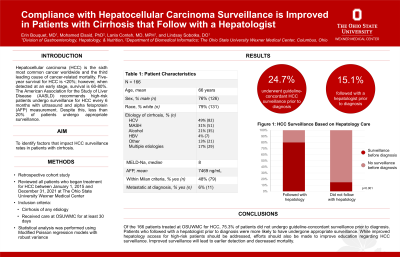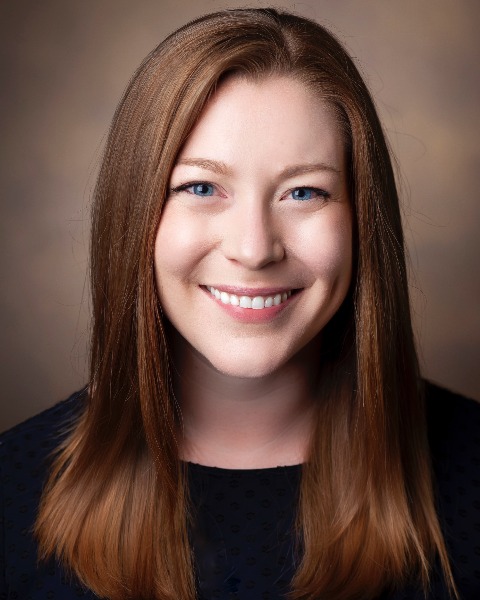Monday Poster Session
Category: Liver
P2403 - Compliance With Hepatocellular Carcinoma Screening Is Improved in Patients With Cirrhosis That Follow With a Hepatologist
Monday, October 23, 2023
10:30 AM - 4:15 PM PT
Location: Exhibit Hall

Has Audio

Erin Bouquet, MD
The Ohio State Wexner Medical Center
Columbus, OH
Presenting Author(s)
Erin Bouquet, MD1, Mohamed I. Elsaid, PhD, MPH2, Lanla F. Conteh, MD, MBA, MPH3, Lindsay A. Sobotka, DO1
1The Ohio State Wexner Medical Center, Columbus, OH; 2The Ohio State University, Columbus, OH; 3The Ohio State University Wexner Medical Center, Columbus, OH
Introduction: Despite the American Association for the Study of Liver Diseases (AASLD) recommendations for patients with cirrhosis to undergo hepatocellular cancer (HCC) screening every 6 months, compliance has been low. This can result in a diagnosis of HCC at advanced stages with limited treatment options. We aim to determine if compliance in HCC screening is improved in patients that follow with a hepatology provider.
Methods: This observational retrospective study evaluated patients with cirrhosis and HCC that received care at The Ohio State University Wexner Medical Center between January 1, 2015, and December 31, 2021. Modified Poisson regression models with robust variance were utilized to examine the adjusted associations, on the prevalence ratios (aPR) scale, between guideline-concordant HCC screening and the status of follow-up by a hepatologist pre-diagnosis. All models were adjusted for demographics, cirrhosis etiology, hepatic decompensation features, and Model for End-Stage Liver Disease-Sodium (MELD-Na) score.
Results: The study included 166 patients with cirrhosis and HCC. Demographics included an average age of 66 years, 76% male, 79% white, 54% married and 65% Medicare insurance. The most common etiologies of cirrhosis were viral hepatitis C and alcohol, and the average MELD-Na score at time of diagnosis was 10. Only 15.1% of patients were followed by a hepatologist and 24.7% had guideline-concordant HCC screening before HCC diagnosis. The prevalence of guideline-concordant HCC screening was significantly higher amongst patients seen by a hepatologist pre-HCC compared to those who were not (80% vs. 14.9%, p< 0.0001). The adjusted prevalence ratio was significantly higher in patients seen by a hepatologist pre-HCC diagnosis compared to patients who were not (aPR 5.01, 95% CI: 2.62 to 9.58). An estimated 6.6% of patients had metastatic disease at diagnosis of which none had followed with a hepatology provider or completed screening exams in the 6 months prior to diagnosis of HCC.
Discussion: These findings show a significantly higher prevalence of guideline-concordant HCC screening amongst patients with cirrhosis seen by a hepatologist than those who do not. Additional education should be provided to primary care physicians about the importance of HCC screening in patients with cirrhosis. If accessible, patients with cirrhosis should be referred to a hepatology provider in order to improve HCC screening adherence, potentially enhancing early HCC detection and treatment options.
Disclosures:
Erin Bouquet, MD1, Mohamed I. Elsaid, PhD, MPH2, Lanla F. Conteh, MD, MBA, MPH3, Lindsay A. Sobotka, DO1. P2403 - Compliance With Hepatocellular Carcinoma Screening Is Improved in Patients With Cirrhosis That Follow With a Hepatologist, ACG 2023 Annual Scientific Meeting Abstracts. Vancouver, BC, Canada: American College of Gastroenterology.
1The Ohio State Wexner Medical Center, Columbus, OH; 2The Ohio State University, Columbus, OH; 3The Ohio State University Wexner Medical Center, Columbus, OH
Introduction: Despite the American Association for the Study of Liver Diseases (AASLD) recommendations for patients with cirrhosis to undergo hepatocellular cancer (HCC) screening every 6 months, compliance has been low. This can result in a diagnosis of HCC at advanced stages with limited treatment options. We aim to determine if compliance in HCC screening is improved in patients that follow with a hepatology provider.
Methods: This observational retrospective study evaluated patients with cirrhosis and HCC that received care at The Ohio State University Wexner Medical Center between January 1, 2015, and December 31, 2021. Modified Poisson regression models with robust variance were utilized to examine the adjusted associations, on the prevalence ratios (aPR) scale, between guideline-concordant HCC screening and the status of follow-up by a hepatologist pre-diagnosis. All models were adjusted for demographics, cirrhosis etiology, hepatic decompensation features, and Model for End-Stage Liver Disease-Sodium (MELD-Na) score.
Results: The study included 166 patients with cirrhosis and HCC. Demographics included an average age of 66 years, 76% male, 79% white, 54% married and 65% Medicare insurance. The most common etiologies of cirrhosis were viral hepatitis C and alcohol, and the average MELD-Na score at time of diagnosis was 10. Only 15.1% of patients were followed by a hepatologist and 24.7% had guideline-concordant HCC screening before HCC diagnosis. The prevalence of guideline-concordant HCC screening was significantly higher amongst patients seen by a hepatologist pre-HCC compared to those who were not (80% vs. 14.9%, p< 0.0001). The adjusted prevalence ratio was significantly higher in patients seen by a hepatologist pre-HCC diagnosis compared to patients who were not (aPR 5.01, 95% CI: 2.62 to 9.58). An estimated 6.6% of patients had metastatic disease at diagnosis of which none had followed with a hepatology provider or completed screening exams in the 6 months prior to diagnosis of HCC.
Discussion: These findings show a significantly higher prevalence of guideline-concordant HCC screening amongst patients with cirrhosis seen by a hepatologist than those who do not. Additional education should be provided to primary care physicians about the importance of HCC screening in patients with cirrhosis. If accessible, patients with cirrhosis should be referred to a hepatology provider in order to improve HCC screening adherence, potentially enhancing early HCC detection and treatment options.
Disclosures:
Erin Bouquet indicated no relevant financial relationships.
Mohamed Elsaid indicated no relevant financial relationships.
Lanla Conteh indicated no relevant financial relationships.
Lindsay Sobotka indicated no relevant financial relationships.
Erin Bouquet, MD1, Mohamed I. Elsaid, PhD, MPH2, Lanla F. Conteh, MD, MBA, MPH3, Lindsay A. Sobotka, DO1. P2403 - Compliance With Hepatocellular Carcinoma Screening Is Improved in Patients With Cirrhosis That Follow With a Hepatologist, ACG 2023 Annual Scientific Meeting Abstracts. Vancouver, BC, Canada: American College of Gastroenterology.
